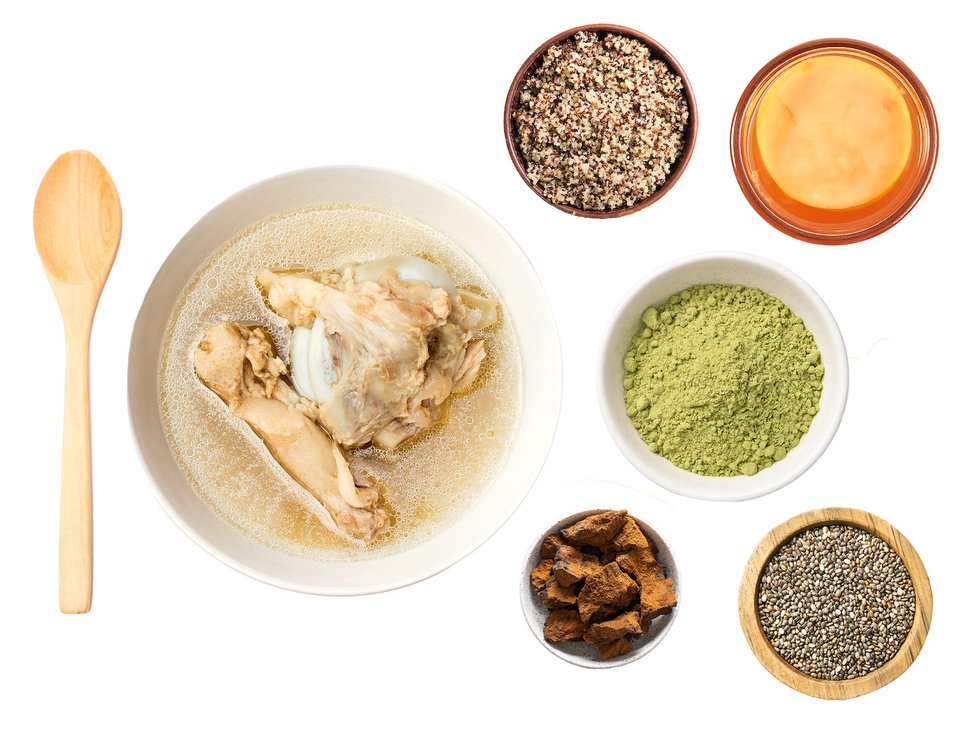And their health benefits equal the hype.

The superheroes of the nutrition world, superfoods, punch above their weight, delivering more fiber, antioxidants, protein, vitamins, and minerals than other healthy foods. While the seven here have ancient origins, they’ve gone trendy lately, as a new generation embraces them.
Bone Broth
Firmer skin? Better sleep? Juicy joints? Chefs have been simmering meaty bones since the dawn of time. Now that it’s bone broth, the buzz around this Instagrammable health elixir has turned frothy, for good reason: bone broth contains calcium, potassium, magnesium, phosphorus, and traces of glycine, a sleep-promoting amino acid.
The marrow in bone broth delivers vitamins A and K2, minerals including manganese, iron, boron, and selenium, as well as omega fatty acids and collagen. From cartilage, it also gets glucosamine and chondroitin to support joint health.
Chia Seeds
With 11 grams of fiber packed into just two tablespoons, tiny chia seeds help control cholesterol, inflammation, and triglycerides to protect cardiovascular health. When mixed with liquid, chia seeds expand into a gel, slowing digestion to keep you feeling full longer. Sprinkle them into smoothies, over yogurt and salads, or add to baked goods.
When they’re sprouted—remember Chia Pets?—the seeds grow into microgreens, great for salads and sandwiches. Chia’s protein contains the nine essential amino acids the body can’t make on its own. The seeds also deliver unsaturated fat, calcium, zinc, copper, and omega-3 fatty acids.
Kombucha
The gently fizzy kombucha and fermented foods—like kimchi, pickles, miso, yogurt, and even sauerkraut—are everything everywhere all at once, and they’re not going away. They’re rich in probiotics, the good bacteria that supports gut health to improve digestion and reduce inflammation. Kombucha, the star of the fermented lineup, may benefit the immune system, but check labels: some brands are high in sugar while others contain modest amounts of alcohol.
Moringa
It sounds like a Latin dance craze, but Moringa oleifera is the “miracle tree” in its native India, Pakistan, and Nepal. Crazy-rich in vitamin C, vitamin E, and beta carotene, Moringa is a little like matcha, only better, with 10 times more fiber, 30 times more protein, and 100 percent more calcium. Its bitter taste is best camouflaged in fruity smoothies. And while it’s caffeine-free, moringa’s fatigue-fighting vitamins and minerals deliver a smooth pickup without caffeine’s jitters or energy crash.
Ancient Grains
Rich in phytochemicals known to combat chronic disease, ancient grains include amaranth, teff, quinoa, black barley, millet, red rice, sorghum, quinoa, farro, and fonio, among others. Typically unrefined, they’re also higher in protein, omega-3 fatty acids, B vitamins, and zinc than their processed counterparts. A great source of fiber, they’re absorbed slowly to help regulate blood sugar. Ancient grains also aid in the production of certain fatty-acid binding proteins. Millet is especially rich in magnesium while sorghum helps lower cholesterol and promote heart health.
Chaga Mushrooms
These rock-like fungi grow on birch trees in super-cold climates like Siberia. High in fiber and low in calories, chaga is often ground into a powder to make tea and turns up in nutrition supplements and skin care products. High in antioxidants, chaga helps fight inflammation and may even help reduce cholesterol. According to the Cleveland Clinic, some studies show chaga slows growth in certain cancerous tumors while others point to chaga’s use in reducing blood sugar levels and improving insulin resistance.
Tiger Nuts

Chewy in texture with a sweet, nutty coconut-like flavor, tiger nuts are a tuber that resembles wrinkled chickpeas. Cultivated thousands of years ago in Egypt, they’re also known as chufa, yellow nutsedge, or earth almonds. Loaded with fiber, vitamins, minerals, and antioxidants, tiger nuts’ health benefits include improved digestion and a reduced risk of heart disease.
This article originally appeared in the June 2023 issue.








